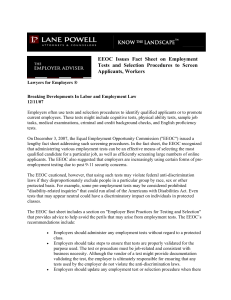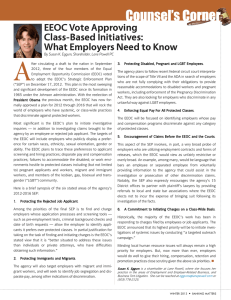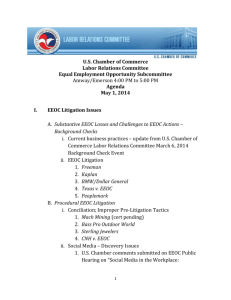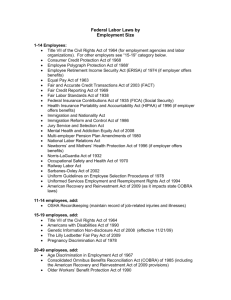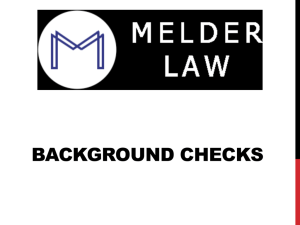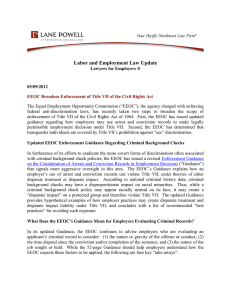Employer Use of Criminal Background
advertisement
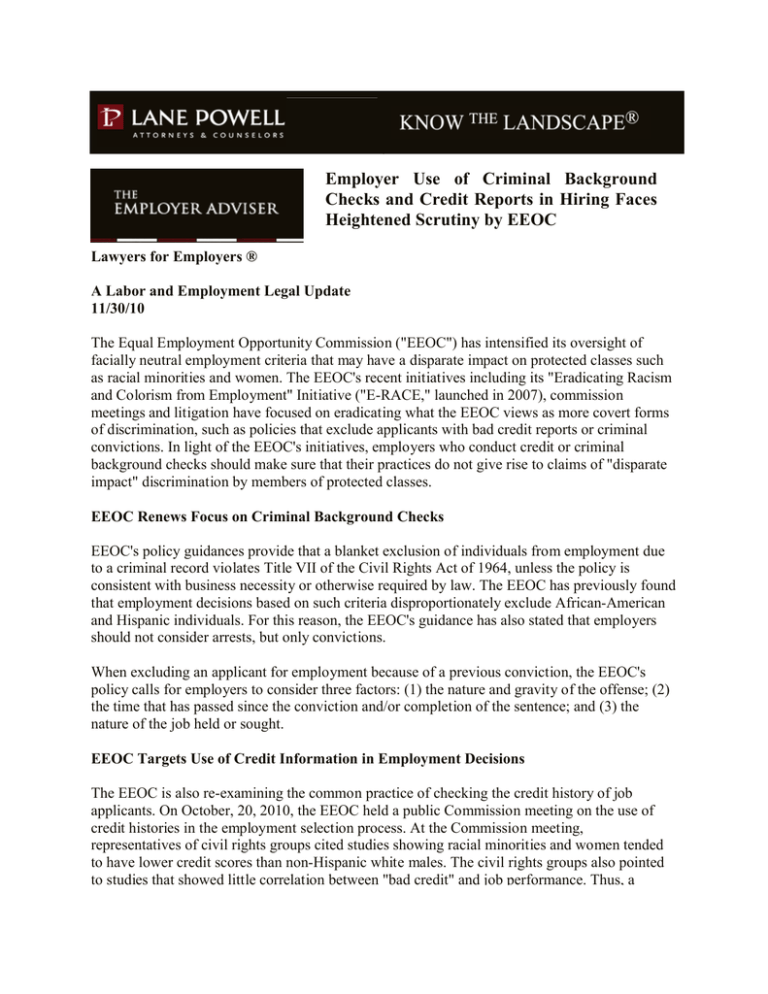
Employer Use of Criminal Background Checks and Credit Reports in Hiring Faces Heightened Scrutiny by EEOC Lawyers for Employers ® A Labor and Employment Legal Update 11/30/10 The Equal Employment Opportunity Commission ("EEOC") has intensified its oversight of facially neutral employment criteria that may have a disparate impact on protected classes such as racial minorities and women. The EEOC's recent initiatives including its "Eradicating Racism and Colorism from Employment" Initiative ("E-RACE," launched in 2007), commission meetings and litigation have focused on eradicating what the EEOC views as more covert forms of discrimination, such as policies that exclude applicants with bad credit reports or criminal convictions. In light of the EEOC's initiatives, employers who conduct credit or criminal background checks should make sure that their practices do not give rise to claims of "disparate impact" discrimination by members of protected classes. EEOC Renews Focus on Criminal Background Checks EEOC's policy guidances provide that a blanket exclusion of individuals from employment due to a criminal record violates Title VII of the Civil Rights Act of 1964, unless the policy is consistent with business necessity or otherwise required by law. The EEOC has previously found that employment decisions based on such criteria disproportionately exclude African-American and Hispanic individuals. For this reason, the EEOC's guidance has also stated that employers should not consider arrests, but only convictions. When excluding an applicant for employment because of a previous conviction, the EEOC's policy calls for employers to consider three factors: (1) the nature and gravity of the offense; (2) the time that has passed since the conviction and/or completion of the sentence; and (3) the nature of the job held or sought. EEOC Targets Use of Credit Information in Employment Decisions The EEOC is also re-examining the common practice of checking the credit history of job applicants. On October, 20, 2010, the EEOC held a public Commission meeting on the use of credit histories in the employment selection process. At the Commission meeting, representatives of civil rights groups cited studies showing racial minorities and women tended to have lower credit scores than non-Hispanic white males. The civil rights groups also pointed to studies that showed little correlation between "bad credit" and job performance. Thus, a blanket exclusion of applicants with "bad credit" may have a disparate impact on protected groups, without being justified by business necessity, which would violate Title VII. Speakers on behalf of employers noted at the meeting that credit histories are often sought as part of mandatory background checks for jobs that involve access to customers' money. Further, those representing employers pointed out that credit reporting agencies never reveal the actual credit score to the employer, but rather a narrative of the individual's credit history. Finally, proponents of credit checks argued that no research has shown a relationship between use of credit reports and a disparate impact on minority job opportunities. While EEOC plans no immediate actions based on the October 2010 Commission meeting, it has reiterated that employers should ensure that any use of credit history in the employment process be entirely job-related. The statements of the panelists at the October 2010 Commission meeting, along with their biographies, can be found on the EEOC's website. "Equal Employment for All Act" May Severely Restrict Use of Credit Checks Debate over employer use of credit history in employment decisions may be rendered moot if Congress passes the Equal Employment for All Act, H.R. 3149. According to its sponsors, the Act aims to assist those who have traditionally been viewed as having difficulties with credit, including students, recent college graduates, low-income families, senior citizens and minorities, in rebuilding their credit by increasing access to the job market. The Act would prohibit the use of credit checks for employment purposes, unless the applicant is subject to national security or FDIC clearance, the job is a supervisory or management position of a financial institution, or where otherwise required by law. Employers in Washington and Oregon, as well as other states, should be mindful of state legislation that already restricts employers from conducting credit checks without a nexus to the job or a legally-mandated duty. What This Means for Employers In the face of the EEOC's heightened scrutiny of facially neutral employment criteria, employers should be especially cautious of blanket policies or practices that exclude applicants based on prior criminal convictions or bad credit, regardless of the passage of time or the position sought. When such policies do exist, employers must be able to articulate how the exclusion is narrowly drawn and consistent with business necessity or otherwise required by law. For instance, a relatively recent reckless driving conviction may be very relevant if the position in question requires regular driving and insurability by the employer's carrier. On the other hand, the identical conviction, particularly if it occurred long ago and when an applicant was young, may not be sufficiently "job-related" to a manual laborer position to survive disparate impact scrutiny. Employers should carefully review their practices and policies to ensure that they can justify, as required by business necessity or other legal/regulatory requirements, any screening mechanisms that could disparately impact racial minorities or other protected classes. 2 For more information, please contact the Labor and Employment Law Practice Group at Lane Powell: 206.223.7000 Seattle 503.778.2100 Portland 907.277.9511 Anchorage lanepowell@lanepowell.com www.lanepowell.com We provide Employer Adviser as a service to our clients, colleagues and friends. It is intended to be a source of general information, not an opinion or legal advice on any specific situation, and does not create an attorney-client relationship with our readers. If you would like more information regarding whether we may assist you in any particular matter, please contact one of our lawyers, using care not to provide us any confidential information until we have notified you in writing that there are no conflicts of interest and that we have agreed to represent you on the specific matter that is the subject of your inquiry. Copyright © 2010 Lane Powell PC Seattle - Portland - Anchorage - Olympia - Tacoma - London 3
